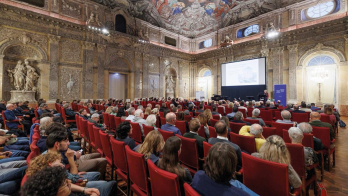
On 13-14 May, CERN hosted a meeting for a taskforce aiming to develop a set of recommendations for the reconstruction of scientific collaboration with the countries of south-east Europe.
In the past, CERN’s involvement in particle physics has provided a valuable catalyst in overcoming political obstacles. During the Cold War, scientific exchange between CERN and the former Soviet Union helped to prepare the ground for the establishment of today’s cordial relations. It is hoped that scientific collaboration in and with south-east Europe will be similarly fruitful.
The meeting at CERN followed a conference, organized in the framework of UNESCO’s Regional Office for Science and Technology for Europe, that was held in Venice on 24-27 March. It was attended by delegates from south-east Europe and international experts including representatives of the European Science Foundation, the European Union and the Academia Europaea, as well as observers from CERN.
The aim of the conference was to seek resources and assess the prospects for integrating R&D in south-east Europe into the infrastructure of other European countries. With these goals in mind, the taskforce that met at CERN drew up a number of recommendations that will be forwarded to UNESCO and submitted at its General Conference in Paris on 6-7 November.
Among other things, the taskforce recommends the promotion of educational exchanges between the countries of south-east Europe, with the assistance of scientists in neighbouring countries (Hungary, Italy and Greece) and observer countries (France, Poland, Germany and the UK). The taskforce is also recommending the development of high-capacity electronic networks to offer the same opportunities for access to information to all scientists in the countries of south-east Europe.
*The countries of south-east Europe are: Albania, Bosnia and Herzegovina, Bulgaria, Croatia, the former Yugoslav Republic of Macedonia, Greece, Romania, Slovenia, Turkey and Yugoslavia.







